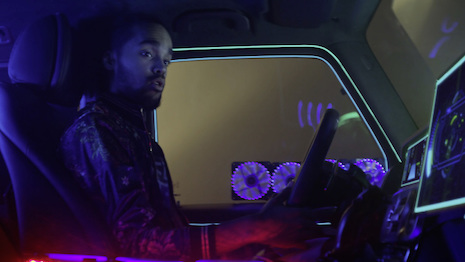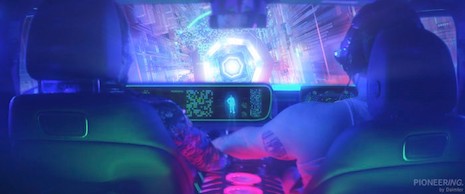 The Mercedes In-Car Gaming Challenge aims to up entertainment in vehicles. Image courtesy of Daimler
The Mercedes In-Car Gaming Challenge aims to up entertainment in vehicles. Image courtesy of Daimler
German automaker Mercedes-Benz is looking to gamify the in-vehicle experience, as future autonomous driving capabilities open the door to more immersive forms of mobile entertainment.
The brand’s parent company Daimler is launching the Mercedes-Benz In-Car Gaming Challenge, which asks students, designers and startups to envision gaming solutions for cars and buses, which work with the vehicle’s own infrastructure or mobile devices. This global competition reflects the growing effort among automakers to reimagine how the driving experience will look once consumers do not have to take the wheel.
"We’re convinced that the car of the future will not only be a car but also a private 'retreat area,'" said Silke Koegler, spokesperson for Mercedes-Benz, Stuttgart, Germany. "In this context, autonomous driving will offer lots of advantages for future passengers; one of them will be more free time inside the car, and so a better life quality in the dense traffic of the 21st century.
"The question 'What can I do with my time during my daily commute?' will be a central one to answer," she said. "Some people will use their time for working, others for relaxing or reading a book and some others maybe for gaming.
"We as a mobility services provider are now starting off to find a range of solutions for in-car-entertainment that provide our customers a really new experience while driving."
Leisure travel
This challenge builds on Mercedes’ existing relationship with esports. The automaker has partnered with ESL Gaming Network since 2017, and ESL is acting as a partner and member of the jury for the contest.
Daimler launched its competition on March 22 with an open call, and entries will be accepted through May 16.
There are two different tracks to the challenge. An Innovators challenge is centered on students, gamers, developers or designers, while startups and businesses can take part in a Startup challenge.
Applicants can enter the challenge in teams of one to five people. At the end of the process, five teams from both the Innovators and Startup sides will get a chance to present their ideas in Stuttgart, Germany.
Three student teams will receive a collective 10,000 euros, or about $11,300, to fund their projects and tickets to an ESL tournament.
Startups will have the possibility of proof of concept and the launch of their idea in Mercedes vehicles.
Mercedes will possibly integrate a project into its cars. Image courtesy of Daimler
The contest is welcoming games that use the vehicles’ infrastructure, as well as car-to-car communication and mobile platforms.
For instance, a team could create a solution that enables bus passengers to play a game together or against each other.
Daimler also says that it is open to all types of games, including role-playing, racing or educational diversions.
In addition to this competition, Mercedes has been working to innovate and use its cars as immersive gaming environments.
At Mobile World Congress, Daimler turned the brand’s CLA into a game controller.
Consumers could climb into the car to play SuperTuxKart. The speed of the game could be adjusted with the accelerator and brake pedals, while the steering wheel was used to navigate the imagined world.
This game was designed to be operated in a parked car, but Mercedes sees the potential for gaming expanding as autonomous vehicles hit the road.
"What’s so special about gaming in a car is the interactive character," Ms. Koegler said. "While so far we’ve primarily had passive entertainment options like radios, CD-players or TV screens for backseat passengers available in cars, 'immersive gaming' offers a whole range of new interactive possibilities.
"Games can be connected with in-car electronics. Movable seats could be used to simulate acceleration, for example, and braking could be imitated by belt tensioners," she said. "The air conditioning system could be used to create a virtual slipstream, or spread fragrances. Ambient lighting could be used to create a wide variety of moods, from a sunset to a lunar eclipse.
"Tactile feedback from displays and controls can enhance the feeling of being right at the center of action. In this way all senses are involved in a completely new and innovative experience.
Accelerating towards autonomy
Automakers are preparing for autonomous driving by focusing on the passenger experience in a hands-free environment.
Britain’s Jaguar Land Rover is aiming to make car travel more comfortable for passengers by rolling out technology that personalizes cabin and driving settings to prevent motion sickness.
Following research, Jaguar Land Rover has developed an algorithm that can assess a rider’s wellness and adjust accordingly to reduce nausea. A number of the company’s vehicles are already outfitted with solutions to combat motion sickness, but this first phase of research will lead to further innovations in Jaguar Land Rover cars.
As autonomous cars take off in the future and passengers are less likely to be behind the wheel and more likely to be multitasking, motion sickness prevention will become more important (see story).
Consumer satisfaction with new-vehicle technology has improved, but automakers need to be keen about what features drivers use the most to make the wisest investments of their efforts.
According to the J.D. Power 2018 U.S. Tech Experience Index (TXI) Study, navigation and voice recognition are among the most popular technologies used by drivers, but they are more likely to use their smartphones for those features than in-vehicle touchpoints. Automakers should instead focus on technology they alone can provide, though adoption of these advanced features varies widely among car manufacturers (see story).
“The words ‘in the future’ are most important here," said Jeff Hasen, strategist at Possible Mobile, Seattle. "We are a long, long way from autonomous autos for the masses.
"With that said, what does Mercedes have to lose in being forward-thinking, creating news and bringing in an audience that may not otherwise have Mercedes in its consideration set?" he said.
“Given the popularity of Uber, Lyft and others, auto manufacturers must reimagine and deliver on innovation. Some won’t feel a need to have a personal car. Others will want an experience not recognizable by previous generations."
